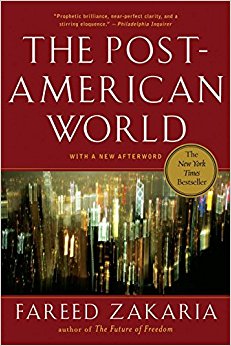Nine years ago, US journalist and author Fareed Zakaria penned a provocative title for his take on world affairs: The Post-American World. In the final months of the Bush administration, the title may not have seemed too far removed from reality.
After a disastrous foreign policy ‘misadventure’ in Iraq, coupled with the biggest financial crisis since the Great Depression, America’s reputation as a global power – indeed, the global power – had been badly shaken.
Despite this immediate context, Zakaria was taking a broader view towards the future. His argument was “not about the decline of America, but rather about the rise of everyone else.”
Looking to the past, he argues that there have been three major power shifts in global politics over the last five hundred years. First, science, technology, commerce and capitalism contributed to the ‘rise of the Western world’.
Second came the ‘rise of the United States’ as it industrialised at the turn of the last century. America came to dominate the world through economics, but also through politics and culture.
According to Zakaria, the next phase is happening before our eyes: ‘the rise of the rest’. The United States remains the world’s largest national economy, but China isn’t far behind. The fastest growth is happening elsewhere.
The more significant part of this phase, however, could be the political changes in the international order. Iraq precipitated a decline in American influence; Zakaria lists a raft of countries that have been increasingly assertive: China, India, Russia, Japan, Brazil, Mexico and South Africa.
This week Zakaria updated his prognosis on the ‘post-American world’ on his CNN show. With President Trump in the White House, he observes that:
People around the world increasingly believe that they can make do without America. Trump’s presidency has made the US something worse than be feared or derided. It is becoming irrelevant.
The United States continues to dominate the global economy, but it is in the political domain where other states and world leaders are now making the biggest relative gains. Increasingly, the rest of the world acknowledges that there are alternatives to American leadership.
According to a global survey by Pew Research, Xi Jinping, Vladimir Putin and Angela Merkel are more trusted to ‘do the right thing’ than President Trump.
America appears to have turned inward; as people around the world recognise this, so too other countries try to fill the vacuum with their own agendas. Zakaria recognised in 2008 that America was losing interest in some of the very things that had facilitated its own success – free markets, trade, immigration and technological change.
But even he has been surprised by the shift in policy and tone over the last six months:
Amidst the parochialism, ineptitude and sheer disarray of the Trump presidency, the post-American world is coming to fruition much faster than I ever expected.
Is America in decline, or is the rest of the world just rising? Is he a pessimist or simply a realist? Nine years after its first publication, Fareed Zakaria’s account may not amount to a prophecy, but his core observations may help us make sense of some of the big trends in the global order.
 The Post-American World (2008) is published by W. W. Norton and Company Ltd.
The Post-American World (2008) is published by W. W. Norton and Company Ltd.
Also published on Medium.
